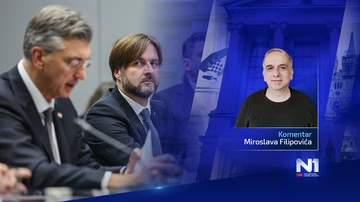PM: The inflation rate in 2024 is in line with expectations and forecasts

The inflation rate is exactly in line with the government's expectations and will be below 3% for the whole of 2024, which is significantly lower than the rates in 2022 and 2023, Prime Minister Andrej Plenkovic said at a government meeting on Thursday.
We have taken into account the expected inflation fuelled by high consumption and the rise in food and service prices in December in the government’s projections, but the basic goal remains for overall inflation to be below 3% in 2024, the prime minister said.
"The government has helped citizens and the economy"
The Croatian Bureau of Statistics reported on Wednesday that the inflation rate measured by the consumer price index was 3.4% in December, marking the third consecutive month of accelerated growth in overall prices. Eurostat reported that the Croatian inflation rate in December, as measured by the harmonised consumer price index, was 4.5%, the highest of any country in the eurozone.
"On an annual basis, average inflation is exactly as forecast by the Ministry of Finance and is slightly below three per cent, i.e. 2.975%," said Prime Minister Plenkovic.
He recalled that the annual inflation rate was 10.7% in 2022 and 8.4% in 2023, and that the government expects an annual rate of 2.7% in 2025 and 2.3% in 2026.
The government has helped citizens and the economy with a series of aid programmes and measures to offset the price increase, including intervention in energy prices and 30 products from the consumer basket, he said.
"It's not true that inflation had 'eaten up' wage growth"
Plenkovic announced a review of these products in the coming days, with some to be removed and others added to the list. It is crucial that energy prices do not influence inflation, he added, calling on "market players" to take responsibility for pricing.
He also mentioned that the government has lowered the standard VAT rate for certain products, so he said the real average VAT rate is slightly above 20%, although the general rate is set at 25%.
Despite inflation of around 3% in 2024, wages increased by 10% in the first ten months of last year compared to the previous year, and during the entire period of government under his leadership, wages increased by 75%, while pensions increased by 89%, Plenkovic said.
It was therefore not true that inflation had "eaten up" wage growth, considering that the overall increase during these governments was between 31% and 32%.
Kakvo je tvoje mišljenje o ovome?
Pridruži se raspravi ili pročitaj komentare
Kakvo je tvoje mišljenje o ovome?
Pridruži se raspravi ili pročitaj komentare
NAJČITANIJE
Oglas
Oglas
Najnovije
Oglas
Oglas



 Srbija
Srbija
 Bosna i Hercegovina
Bosna i Hercegovina
 Slovenija
Slovenija



























































